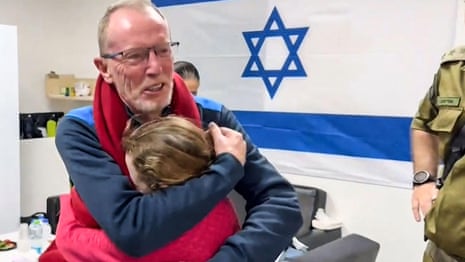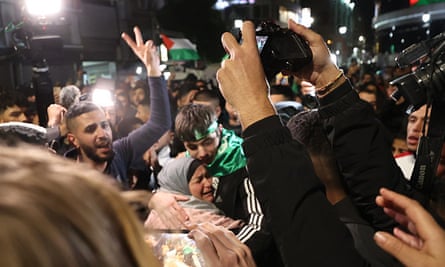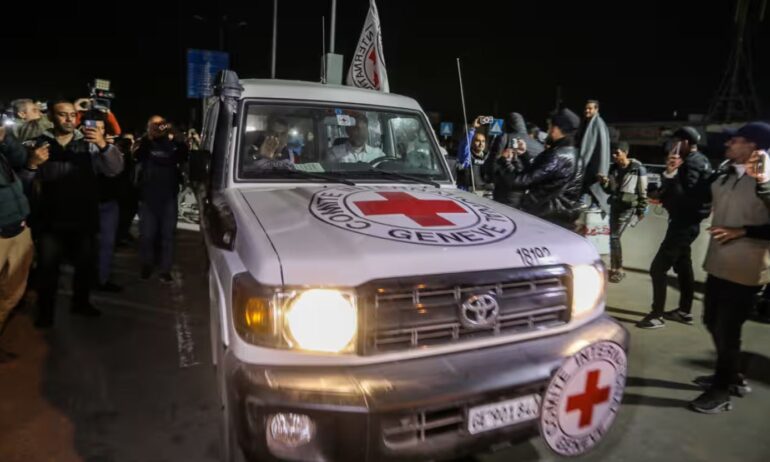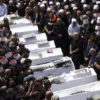Israel frees more prisoners in exchange but insists its military campaign in Gaza is far from over
The third exchange of hostages and prisoners between Hamas and Israel has taken place as the US expressed hope that a fragile four-day truce in Gaza would be extended beyond Monday, while Israel indicated its campaign was far from over.
Israel said 17 hostages were released by Hamas, including a Russian national and three Thai nationals. The Israelis were all women or children. Thirty-nine Palestinian prisoners, also women and children, were freed from Israeli jails, authorities said.
The day brought several powerfully emotional moments, with the release from Gaza of a girl orphaned in Hamas’s attack in Israel last month and aid finally reaching the north of Gaza, which has been devastated by Israeli bombardment.
Joe Biden welcomed the release of four-year-old Abigail Edan, a US-Israeli dual national, and said he would like to “see the pause go on as long as prisoners are getting released”.
The US president added that his administration would “continue to remain personally engaged to see that this deal is fully implemented and work to extend the deal as well”.

Tempering hopes of a lasting halt to the offensive, Benjamin Netanyahu said on a visit to Israeli forces in Gaza: “We are continuing until the end, until victory. Nothing will stop us.”
The Israeli prime minister also said on Sunday that he had told Biden in a phone call that Israel would resume its campaign with full force once the truce comes to an end, but that he would welcome extending it if it facilitated the release of 10 additional hostages every day as agreed under the original Qatari-brokered deal.
A huge demonstration calling for the release of the hostages took place in Tel Aviv on Saturday night, with relatives of those still held increasingly assertive as a political force. The release of Edan, whose parents were killed in front of her while her older siblings hid in a cupboard, is an important moment in Israel.
“What she endured is unthinkable,” Biden said.
Liz Hirsh Naftali and Noa Naftali, her great-aunt and cousin, said: “We hoped and prayed today would come. There are no words to express our relief and gratitude that Abigail is safe and coming home … Today’s release proves that it’s possible. We can get all hostages back home. We have to keep pushing.”
Another hostage, Elma Avraham, 84, was seriously ill on arrival in Israel and taken straight to hospital by helicopter.
Hamas is thought to be split over extending the ceasefire, with political leaders based in Qatar favouring an extension while those in Gaza feeling that with almost 200 hostages still in their hands, they are in a strong position and should resist any concessions. The group said in a statement on Sunday that it was seeking to extend the truce should serious efforts be made to increase the number of Palestinian detainees released from Israel.
The truce has brought the first significant pause in seven weeks of war marked by the deadliest Israeli-Palestinian violence in decades and vast destruction and displacement across the Gaza Strip.
The conflict was triggered when Hamas broke through the perimeter fence around Gaza on 7 October and attacked communities in southern Israel, killing more than 1,200 people, mostly civilians in their homes or at a music festival. More than 240 were abducted, including infants, elderly, disabled people, soldiers and foreign farm workers.
More than 13,300 Palestinians have been killed by the Israeli offensive launched after the Hamas attack, roughly two-thirds of them women and children, according to the health ministry in Hamas-ruled Gaza. More than a million people have been forced from their homes.

Under intense international pressure, Israel has agreed to release at least 150 Palestinian prisoners and allow as many as 300 trucks of humanitarian aid into the coastal territory after weeks of a crippling blockade of fuel, food, medicine and other essentials that has caused an acute humanitarian crisis.
Calls from the hostages’ families to prioritise their release have sharpened the dilemma facing Israel’s leaders as they seek to reconcile the military offensive with the goal of freeing all of the captives. Many officials argue that Hamas only makes concessions when faced with overwhelming force, so the offensive should continue.
Observers and sources close to the negotiations said a major problem is the almost total absence of trust between Israel and Hamas.
Israel has accused Hamas of failing to allowing the International Committee of the Red Cross to visit hostages held in Gaza, while a coalition of groups representing hostages’ relatives criticised it for releasing children without their parents. Both were said to be breaches of the deal.
Osama Hamdan, a Hamas spokesperson, accused Israel on Sunday of allowing only 65 of 340 aid trucks that had entered Gaza since Friday to reach the north of the territory, or “less than half of what Israel agreed on”. Israel said it was Hamas that had stopped aid moving north.
The al-Qassam Brigades, the military wing of Hamas, also said Israel had failed to respect terms for the release of Palestinian prisoners that factored in their time in detention.
The Palestinians so far released by Israel included at least two women who had been given long sentences after being convicted by Israeli courts of violent attacks. Many Palestinians view prisoners held by Israel, including those implicated in attacks, as heroes resisting occupation, and have celebrated their release.
“All the Islamic world and the Arab world supports Hamas now … But I hope the truce will continue and the war will stop and people will go back to their homes,” said Hamed Abu Abed, a 46-year-old driver in Ramallah.

The war in Gaza has been accompanied by an increase in violence in the Israeli-occupied West Bank, where the Israeli army has arrested hundreds of Palestinians since the start of the war, mostly people it suspects of being Hamas members.
In Ramallah, Palestinian families anxiously waited for news, with many relatives of the many thousands of Palestinians detained by Israel hoping that the current list of 300 candidates for release under the deal will be extended.
Usama Shahadeh, whose daughter of Asir, a was arrested two weeks ago after she was shot in the leg after approaching an Israeli checkpoint waving a Hamas flag, said the 17-year-old should be free.
“We are not a political family. She doesn’t know Hamas from hummus. She’s just a headstrong teenager. We are hoping her name will be put on the list. Today, tomorrow, the next day, we just want to see her home,” Shahadeh, a janitor, said.
In southern Gaza, where hundreds of thousands of people from the north have sought refuge, residents lined up outside petrol stations for a second day hoping to stock up on fuel.
The Israeli military has ordered Palestinians not to return to the north or go within a kilometre of the border fence. The Palestinian Red Crescent said Israeli forces opened fire on two farmers in central Gaza on Sunday, killing one of them.
On Sunday, Hamas announced the death of Ahmed al-Ghandour, who was in charge of northern Gaza and a member of its top military council. Ghandour, believed to have been about 56 years old, is the highest-ranking militant known to have been killed in the fighting. Israel has killed large numbers of mid-ranking Hamas commanders but few leaders.
The pause in hostilities between Israel and Hezbollah, the Islamist militia and political movement based in southern Lebanon, appeared to be holding on Sunday night.


